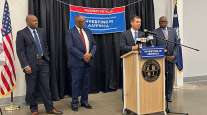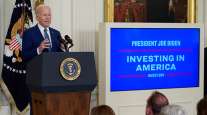Senior Reporter
Industry Applauds Senate Passage of $1 Trillion Bill to Modernize US Transportation

[Stay on top of transportation news: Get TTNews in your inbox.]
Legislation aimed at modernizing the country’s mobility networks, freight corridors and transit systems gained approval in the U.S. Senate on Aug. 10.
After weeks of bipartisan negotiations, senators voted 69-30 to pass the Infrastructure Investment and Jobs Act, a $1 trillion measure consisting of President Joe Biden’s signature infrastructure and climate change proposals from his “build back better” agenda.
The legislation would dedicate about $550 billion in new funds to ameliorate highways, bridges, tunnels and a transportation system in need of major upgrades, according to the American Society of Civil Engineers.
For specific programs, the bill would devote about $100 billion for roads and bridges, $66 billion for freight and passenger rail, $65 billion for broadband internet, $46 billion for severe weather-resilience, or climate change, operations, $39 billion for transit and $25 billion for airports.

Spear
Key freight stakeholders have praised the Senate’s work on the infrastructure legislation. American Trucking Associations President Chris Spear noted, “Americans, and the hardworking men and women who carry this economy on trucks, have waited long enough for Washington to act on our decaying infrastructure.”
“It will be a lasting bipartisan achievement to help the people we represent. It’s going to improve the lives of all Americans. It’s long-term spending to repair and replace and build assets that will last for decades. In doing so, it does make life better for people,” said Sen. Rob Portman (R-Ohio), who helped craft the bill. “It improves the life of the mom or dad who commutes to work and gets stuck in rush hour every day who would much rather be spending that time with their family. It improves the lives of people who are tired of those potholes. We all want to fix those potholes. We all hate them.”
Today’s bipartisan vote on the #Infrastructure Investment and Jobs Act is a testament to what we can achieve when we set politics aside & work together for the good of the country.
This historic bill is the result of months of negotiations between Rs & Ds.
Bipartisanship works! — Rob Portman (@senrobportman) August 10, 2021
Sen. Kyrsten Sinema (D-Ariz.), a co-sponsor, added, “Strong, reliable infrastructure represents more than pipes and pavement. It represents the opportunities for Americans to visit loved ones, new businesses to open and compete globally, veterans to access tele-medicine, and children to learn in safe and effective ways.”
Regarding trucking policy, the legislation would approve an apprenticeship for truckers younger than 21 to operate commercial vehicles interstate, as well as establish a truck-leasing task force. It also would direct the secretary of transportation to further research side-underride guards for commercial vehicles, require the U.S. Department of Transportation to analyze the effectiveness of electronic logging devices and require certain commercial motor vehicles to be equipped with an automatic emergency braking system.
Additionally, the bill would reauthorize the premier federal highway law, which expires at the end of September. And it would partly be funded via unused federal pandemic emergency aid, as well as certain tax enforcement measures.
In the ASCE’s latest report card, the country’s infrastructure received a “C-” grade.
After the infrastructure bill’s passage, Majority Leader Chuck Schumer (D-N.Y.) outlined the consideration of a $3.5 trillion budget plan meant to set in motion debate on climate change and “human infrastructure” proposals. The budget-centric measure would require a simple majority to pass in the Senate.
Republican leaders are criticizing the Democrats’ budgetary strategy.
“They call it $3.5 trillion in spending. Nonpartisan experts say these plans would more likely cost Americans about $5.5 trillion. Trillions more borrowing and trillions more spending when inflation is already sticking American families with higher costs,” said Minority Leader Mitch McConnell (R-Ky.). “New permanent welfare with no work requirements when small businesses are already struggling to find workers. Sweeping amnesty when the southern border is already in crisis.”
With passage of the bill, the measure advances to the House where its consideration is uncertain. Speaker Nancy Pelosi (D-Calif.) said she intends to link a big picture budget plan with the infrastructure package whenever she kicks off the chamber’s legislative process on both matters. House Transportation Chairman Peter DeFazio (D-Ore.), touting the recent passage of his multiyear highway policy update, also has insisted on negotiating provisions in the infrastructure bill with his Senate counterparts.

DeFazio
“I set out for several major objectives to rebuild America’s crumbling infrastructure, bring us into the 21st century, not do another iteration of the Eisenhower[-era] national highway program, but to actually begin to deal with current problems,” DeFazio said last week.
The White House, meanwhile, is endorsing myriad infrastructure policies under consideration on Capitol Hill. The president and his so-called Jobs Cabinet are promoting the “build back better” agenda at transportation hubs around the country, insisting the Senate measure would lead to workforce enhancement and environmental progress.
As press secretary Jen Psaki described the plan, “They’re meant to modernize our infrastructure, put people back to work over the long term and make us more competitive over the long-term.”
Want more news? Listen to today's daily briefing below or go here for more info:




